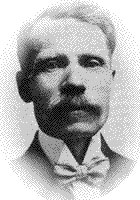Stephan Stephansson
Stephan Stephansson Poems
It was formerly believed, on a sea-battered shore
though the storm at home blasted,
that in the distant west there still lay lands,
where calm and sun never ended,
...
So maudlin, with pity and pathos I stood
If someone who erred got the lashes;
If hanged, I'd weep over the ashes.
With vocal dispraise such injustice I viewed
...
Stephan Stephansson Biography
Stephan G. Stephansson was born in Iceland in 1853. He emigrated with his parents in 1873 to northern Wisconsin. In 1880 he moved to Dakota and from there to a homestead near what was to become the village of Markerville in 1889. His life in Alberta spans a crucial period in the history of the province. From the pioneer years that were linked with the development of the railway to the modest recovery in the late 1920s from the severe recession that followed the Great War of 1914-18. His career also reflects the history of the Icelandic settlement in the Canadian West. At the same time, Stephansson achieved great distinction as a poet, recognized not only by the Icelandic community in North America but also in his native Iceland. Stephansson has been called the greatest poet of the western world. During the seventy-three years of his life, he published more than two thousand pages. In quantity of writings, no other Canadian poet is comparable. The work he produced is considered of the highest standard. In Alberta Stephansson was a farmer. He had been born on a farm in Iceland and he died as a farmer in west central Alberta. Working from dawn to dusk clearing land, grubbing roots, ploughing, seeding, and threshing would have discouraged a lesser man, but Stephan Stephansson appeared to thrive creatively even under such a workload. When asked, he couldn't remember his earliest attempts at composing verse, but certainly had experimented with poetry from very early youth. He continued to perfect his knowledge of the Icelandic language and the various poetic metres while he lived in Wisconsin and the Dakota Territory; but it was in Alberta, living in the Medicine river valley, that he achieved maturity in his writings. His mind was forever working on a new idea or an unfinished poem. Even though the farm work claimed most of the daylight house he often composed poems while cutting hay, milking the cows or feeding the pigs. It was not unusual for him to return hurriedly to the house to jot down a few lines before they escaped. Rainy days and Sundays he spent at his desk. But even this did not satisfy the urge to create. Despite his physical weariness at the end of the day, so faithful was he to his inner voice that the muse of poetry drove him from his bed to his desk to pour out his thoughts and feelings: The long autumn night was approaching the day, And I in my wakefulness quietly lay. I stared in the shadows, my mind in a whirl Attempting the future to measure. What would my seventh new decade unfurl, All Sundays of joy and pleasure? I heard at my doorstep a footstep alight As soft as the rustling leaves in the night And I knew in an instant that visitor's call, Though darkness might seem to confound me; No matter what clattering noise might befall I knew her light footsteps around me. But fancy has always been part of her style. She opened my door which was unlocked the while. I rose from my pillow with gladness and pride, Her visit was such a rare pleasure. I figured my strings as she came to my side With her harp and her crowning treasure. Stephan G. Stephansson was the most remarkable of the Icelandic farmer-poets. Stephansson, using his comprehensive knowledge of the language in his poems, has been credited with the revitalization of his mother tongue. Essentially a man of the nineteenth century he believed in the power of words. A true romantic, he was sure that ideas and ideals, given the wings of verse, could overcome the problems of the human race. He passed away at Markerville, Alberta in 1927.)
The Best Poem Of Stephan Stephansson
In Wartime
In Europe's reeking slaughter pen
They mince the flesh of murdered men
While swinish merchants, snout in trough
Drink all the bloody profits off!

Stephan Stephansson is my great great great grandfather. I found out about him through his poetry for I to love writing. i was going to be a novelist however ive decided thanks to Stephan to be a poet.
your kidding right? HES MY GREAT GREAT GREAT GRANDFATHER TOO!